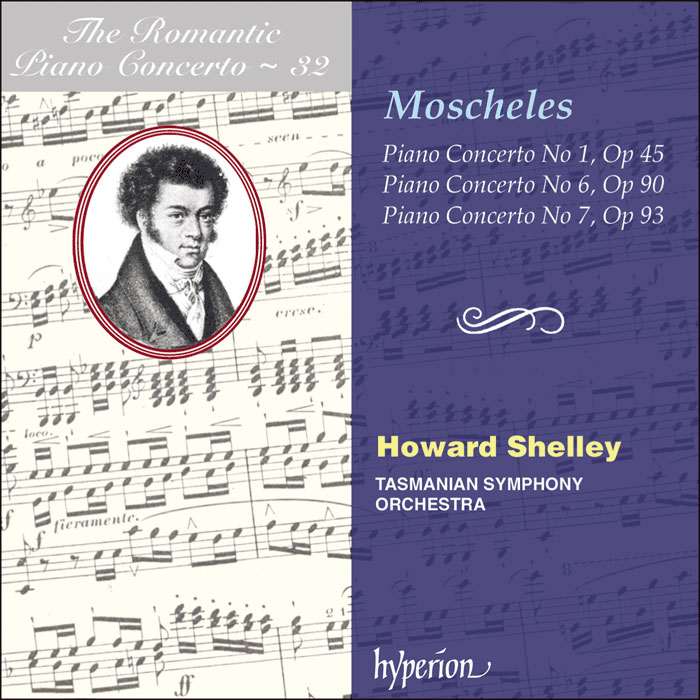Logowanie
Dziś nikt już tak genialnie nie jazzuje!
Bobby Hutcherson, Joe Sample
San Francisco
SHM-CD/SACD - NOWY FORMAT - DŻWIĘK TAK CZYSTY, JAK Z CZASU WIELKIEGO WYBUCHU!
Wayne Shorter, Freddie Hubbard, Herbie Hancock, Ron Carter, Elvin Jones
Speak no evil
UHQCD - dotknij Oryginału - MQA (Master Quality Authenticated)
Chesky! Niezmiennie perfekcyjny
Winylowy niezbędnik
ClearAudio
Double Matrix Professional - Sonic
najbardziej inteligentna i skuteczna pralka do płyt winylowych wszelkiego typu - całkowicie automatyczna
MOSCHELES, Howard Shelley, Tasmanian Symphony Orchestra, Howard Shelley
Piano Concertos 1, 6 & 7
- Piano Concerto No 1 in F major, Op 45
- 1 Movement 1: Allegro maestoso [9:14]
- 2 Movement 2: Adagio [6:33]
- 3 Movement 3: Rondo. Allegro vivace [6:24]
- Piano Concerto No 6 in B flat major 'Fantastique', Op 90
- 4 Movement 1: Allegro con spirito [6:17]
- 5 Movement 2: Andante espressivo [5:24]
- 6 Movement 3: Allegro agitato [1:17]
- 7 Movement 4: Vivace [3:59]
- Piano Concerto No 7 in C minor 'Pathétique', Op 93
- 8 Movement 1: [untitled] [11:28]
- 9 Movement 2: Allegro agitato [3:46]
- 10 Movement 3: Allegro con brio [6:56]
- Howard Shelley - piano
- Tasmanian Symphony Orchestra - orchestra
- Howard Shelley - conductor
- MOSCHELES
'I defy anyone not to be captivated by this delightful, witty, rhythmically vital and spontaneously inventive work, especially when played as stylishly as here' (International Record Review) 'Shelley’s expertise, his immaculate charm and brio cast a brilliant light on every page. His Tasmanian orchestra is with him all the way and Hyperion’s sound and balance are of demonstration quality. An exemplary issue; I can scarcely wait for Volume 3' (Gramophone) 'Shelley’s nimble, elegant playing, while leading his excellent Tasmanian players, is a musical wonder' (Classic FM Magazine) 'Howard Shelley and the Tasmanian Symphony Orchestra give solid accounts of these intriguing scores' (The Times) 'a thoroughly enjoyable disc' (BBC Music Magazine) 'Howard Shelley's account of the First, Sixth and Seventh of the eight Moscheles piano concertos provides powerful argument for their return to the repertoire' (International Piano) 'This disc … boldly captures the irresistible energy and sanguine life of Moscheles’ music' (Music Week) 'played with a taste and vivacity that reflect the temperament of the music … The thing that strikes you most about this music is its lively originality' (The Daily Telegraph) 'freshly performed and directed by Howard Shelley … No need for Hyperion to do anything other than hold their heads high over this one' (musicweb.uk.net) -------------------------------------- The continuation of our survey of Moscheles piano concertos brings us to three works which have never been recorded before. The 1st Concerto, written in 1819, is a very Mozartean affair; though the young composer had become a friend of Beethoven it seems the example of that composer's last three concertos hadn't been followed, instead we have a work full of charm, grace and untroubled lyrical melody. For his final three concertos (6,7 & 8) Moscheles broke away from the traditional three-movement structure and produced works that presage Liszt in their combination of fast and slow movements in one structure. These works, written in London in the 1830's, show that at that time Moscheles, later regarded as a traditionalist, was then at the forefront of the developing Romantic movement in music. The lessons of Beethoven, so absent in his first concerto, are now clearly learned. Howard Shelley has already proved himself the perfect exponent of the repertoire which bridges the classical and romantic period in music. His first Moscheles recording (Concertos 2 & 3 and 'Anticipations of Scotland' - CDA66276) has met with universal acclaim and this release will surely follow.


































